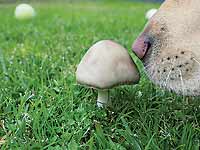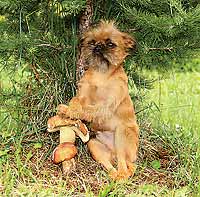 The mushroom is a complex organism that contains several thousand enzymes, nutrients, and proteins in a ratio that offers nutritional benefits. Mushrooms hold important potential value for cats’ and dogs’ health in the areas of immune and digestive health, normal cell growth, promoting the normal detoxification process, helping to protect against environmental stressors, and even joint and respiratory health. Some people are nervous to use mushrooms for pets. A lot of this fear comes from the potential for wild mushrooms to be toxic. But there’s no need to fear these fantastic fungi. Buy organic from a reputable source and see how great they are for your dog’s health. Here is a breakdown of why mushrooms are amazing and the 5 most important mushrooms for supercharging your pet’s immune system. The mushroom is a complex organism that contains several thousand enzymes, nutrients, and proteins in a ratio that offers nutritional benefits. Mushrooms hold important potential value for cats’ and dogs’ health in the areas of immune and digestive health, normal cell growth, promoting the normal detoxification process, helping to protect against environmental stressors, and even joint and respiratory health. Some people are nervous to use mushrooms for pets. A lot of this fear comes from the potential for wild mushrooms to be toxic. But there’s no need to fear these fantastic fungi. Buy organic from a reputable source and see how great they are for your dog’s health. Here is a breakdown of why mushrooms are amazing and the 5 most important mushrooms for supercharging your pet’s immune system.
First, to fully appreciate the benefits a mushroom might offer your pet, let’s define how they differ from molds and fungi. Mushrooms are a fungus that forms a fleshy, above-ground reproductive structure called the “mushroom fruit body.” In contrast, fungi that are not mushrooms do not form fleshy fruit bodies. However, the “mushroom fruit body” or the part that you can see – the stem and cap – is less than 10 percent of a mushroom’s total biomass. The mycelium is the part of the mushroom you don’t see or typically eat. It’s the part that lies beneath the surface of the soil. And it’s the part that may hold the most important nutritional benefits of mushrooms. The mycelia’s highly adept immune system – along with its ability to break down natural organic matter are exactly what makes mushrooms so valuable to mammals.
1. Reishi Mushrooms (Ganoderma lucidum): Known as the mushrooms of immortality. They have anti-tumor effects, anti-inflammatory, anti-viral and immune-stimulating properties. This makes them great for boosting overall health.
In dogs, reishi mushrooms are used to: Help improve heart health, improve immune system and liver function, inhibit antihistamine release, and improve endurance.
Reishi mushrooms are typically used to treat: Cancer, heart disease, arthritis, allergies, viral upper respiratory tract infections, and compromised immune systems.
2. Shiitake Mushrooms (Lentinula edodes): Boast a whopping 30 different enzymes and 10 amino acids. They also have minerals like calcium, zinc, magnesium, iron and selenium. They contain abundant l-ergothioneine and the immune system-supporting polysaccharide lentinan. They stimulate white blood cells, improve circulation, inhibit tumor growth and lower cholesterol. They also taste great too! That makes them really impressive when it comes to your dog’s health (and your own for that matter).
Use shiitake mushrooms to: Reduce the side effects of chemotherapy and radiation, treat Cushing’s disease, help soothe bronchial inflammation, regulate urinary incontinence and reduce seasonal or food based allergy symptoms.
Shiitake “Detox” Broth
Make this broth for your dog and feed it during or after a fast, or if your dog isn’t eating well.
What you’ll need:
5 dried shiitake mushrooms
1 beef bone
¼ cup daikon or beet root
¼ cup carrot
¼ cup celery
1 tsp sea salt
½ tsp turmeric powder
To make the broth: Soak dried mushrooms to rehydrate in 1 cup of cold water overnight. Put bone, veggies, salt and turmeric in soup pot with 4 cups of water. Bring to a boil them simmer covered for about an hour. Add the mushrooms and water you soaked them in, simmer another hour, then remove from the heat.
Give your dog 1 tsp to a tablespoon every few hours when they’re not eating.
3. Maitake Mushrooms (Grifola frondosa): Meaning “dancing mushroom” in Japanese. These mushrooms are known to stimulate t-cells, inhibit tumor growth and lower cholesterol.
Maitake mushrooms are good for: Preventing cancer, supporting the body during chemotherapy and other cancer treatment, Helping manage diabetes, and supporting dogs with liver problems.
4. Turkey Tail (Trametes versicolor): Known for its rich supply of a particular type of polysaccharide – PSK – that may promote immune, digestive, urinary and respiratory health, and normal cellular growth. These are the essential sugars in the body that aid in activating the immune system. This can help protect the body from infection and fight off disease.
A recent study looked at dogs with hemangiosarcoma. This is a common cancer found almost exclusively in dogs. Dogs treated with a compound derived from the turkey tail mushroom had the longest survival times ever reported for dogs with the disease.
But these mushrooms are good for more than cancer. Turkey tail mushrooms can: Help heal pulmonary disorders, treat the inflammation of the urinary and digestive tracts, and decrease the effects of chemotherapy and radiation
5. Cordyceps Mushrooms (Cordyceps militaris): They possess some of the best antifungal and antibacterial properties. They also have three protein-bound polysaccharides and several amino acids. Wild cordyceps mushrooms actually grow on caterpillars. This makes them really expensive to harvest. Luckily, they’re also cultivated by growers. Although cultivated mushrooms may not be quite as potent as wild ones, they’re way more wallet friendly. Studies show that cordyceps mushrooms have impressive antitumor properties. They can protect against liver and heart disease as well.
Cordyceps are also good for treating: Leaky gut syndrome, chronic liver disorders, hyper-lipedema, hypercholesterolemia, kidney failure, cardiac arrhythmias, lung carcinoma, asthma, and many geriatric disorders.
How do you give your dog Mushrooms?
To give your dog mushrooms, you can easily make a tea or broth using dried mushrooms or add powder to their food. If you do want to give your dog whole mushrooms, it’s essential to cook them thoroughly. Raw mushrooms can be really hard for your dog to digest and they may be toxic. They’re safe when cooked. If you buy mushrooms in powdered or capsule form, follow the directions on the package. There are many great mushroom complexes that are made just for dogs and cats. If the product is for humans, assume the dosage instructions are for a 150 lb person. Adjust the amount according to your dog’s weight. Always start with a lower dose and work up gradually to avoid any digestive upset. Start harnessing the power of mushrooms today to boost your pet’s immune system and provide supplements that a bag of dry dog food could never do on their own.
Dog-Friendly Walks/Hikes
in the Moab Area |
Corona Arch - Easy/Moderate. 1.3 Miles one way. Trailhead is 25 minute drive from Moab. North on US-191 to Potash Road (Utah 279).
Mill Creek Pathway - Easy. 1.1 Miles. Little to no driving. Starts at the intersection of 100 South and 100 West, a block off of Main Street.
Portal Overlook - Hard. 2.0 Miles one way. Trailhead is 20 minute drive from Moab. N. on US-191 to Potash Road (Utah 279).
Grandstaff Canyon - Moderate. 2.0 Miles one way. Trailhead is 10-minute drive from Moab. North on US-191 to the River Road (Utah 128) |
|